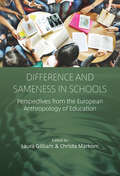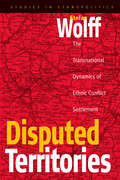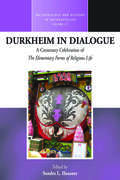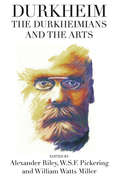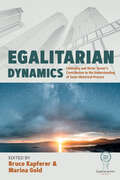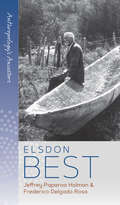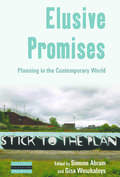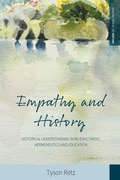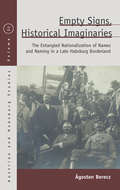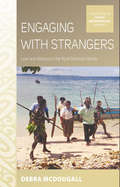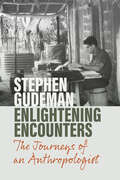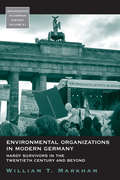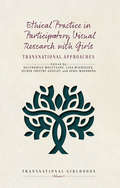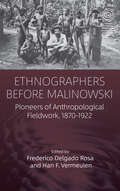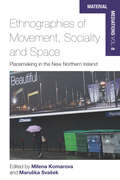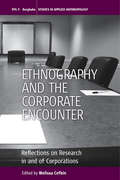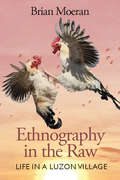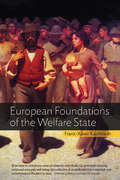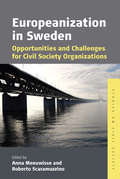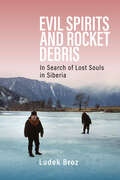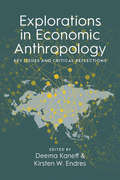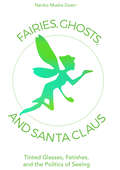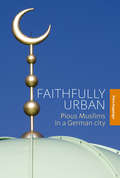- Table View
- List View
Difference and Sameness in Schools: Perspectives from the European Anthropology of Education (EASA Series #48)
by Laura Gilliam and Christa MarkomPresenting European Anthropology of Education through eleven studies of European schools, this volume explores the constructing and handling of difference and sameness in the central institutions of schools. Based on ethnographic studies of schools in Greece, England, Norway, Italy, Switzerland, the Czech Republic, Spain, Austria, Russia, Germany, the Netherlands and Denmark, it illustrates how anthropological studies of schools provide a window to larger society. It thus offers insights into cultural lessons taught to children through policies, institutional structures and everyday interactions, as well as into schools’ entanglement in state projects, cultural processes, societal histories and conflicts, and hence into contemporary Europe.
Disputed Territories: The Transnational Dynamics of Ethnic Conflict Settlement (Ethnopolitics #1)
by Stefan WolffEthnic conflicts have shaped the 20th century in significant ways. While the legacy of the last century is primarily one of many unresolved conflicts, the author contends that Western Europe has a track record in containing and settling ethnic conflicts which provides valuable lessons for conflict management elsewhere. Focusing on ethno-territorial crossborder conflicts in Alsace, the Saarland, South Tyrol, and Northern Ireland, Andorra and the New Hebrides, the author develops a four-dimensional analytical framework that synthesizes the distinct factors that influence the complex relationship between host-state, kin-state, actors in the disputed territory, and in the international context.
Durkheim in Dialogue: A Centenary Celebration of The Elementary Forms of Religious Life
by Sondra L. HausnerOne hundred years after the publication of the great sociological treatise, The Elementary Forms of Religious Life, this new volume shows how aptly Durkheim¹s theories still resonate with the study of contemporary and historical religious societies. The volume applies the Durkheimian model to multiple cases, probing its resilience, wondering where it might be tweaked, and asking which aspects have best stood the test of time. A dialogue between theory and ethnography, this book shows how Durkheimian sociology has become a mainstay of social thought and theory, pointing to multiple ways in which Durkheim¹s work on religion remains relevant to our thinking about culture.
Durkheim, the Durkheimians, and the Arts
by W.S.F. Pickering Alexander Tristan Riley William Watts MillerUsing a broad definition of the Durkheimian tradition, this book offers the first systematic attempt to explore the Durkheimians' engagement with art. It focuses on both Durkheim and his contemporaries as well as later thinkers influenced by his work. The first five chapters consider Durkheim's own exploration of art; the remaining six look at other Durkheimian thinkers, including Marcel Mauss, Henri Hubert, Maurice Halbwachs, Claude Lévi-Strauss, Michel Leiris, and Georges Bataille. The contributors-scholars from a range of theoretical orientations and disciplinary perspectives-are known for having already produced significant contributions to the study of Durkheim. This book will interest not only scholars of Durkheim and his tradition but also those concerned with aesthetic theory and the sociology and history of art.
Egalitarian Dynamics: Liminality, and Victor Turner’s Contribution to the Understanding of Socio-historical Process (Egalitarianism #2)
by Bruce Kapferer Marina GoldLiminality: the state of being ‘betwixt and between’ is one of anthropology’s most influential concepts. This volume reconsiders Victor Turner’s innovative extension of Arnold Van Gennep’s concept of liminality from within the Manchester tradition of Social Anthropology established by Max Gluckman. Turner’s work was grounded in ethnography and engaged with philosophical perspectives in varied socio-historical contexts, extending well-beyond the confines of the anthropology that initially inspired much of his work. Liminality has therefore become a concept with broad interdisciplinary reach. Engaging with topical issues across the globe – from neuroscience to open access publishing and refugee experiences in Europe – this volume launches Turner’s fundamental work into the future.
Elsdon Best (Anthropology's Ancestors)
by Jeffrey Paparoa Holman Frederico Delgado RosaNew Zealander ethnographer, Elsdon Best is a key figure in the history of anthropology due to his involuntary triggering of a fundamental and long-lasting anthropological debate on the Māori concept of hau. This volume is dedicated to this important scholar, who at the same time was shadowed by metropolitan anthropology and became an excluded ancestor, along with his Māori interlocutors and ethnographic collaborators. By recentering his place as one of anthropology’s ancestors, the volume contributes to a new perception of the discipline’s past.
Elusive Promises
by Simone Abram Gisa WeszkalnysPlanning in contemporary democratic states is often understood as a range of activities, from housing to urban design, regional development to economic planning. This volume sees planning differently-as the negotiation of possibilities that time offers space. It explores what kind of promise planning offers, how such a promise is made, and what happens to it through time. The authors, all leading anthropologists, examine the time and space, creativity and agency, authority and responsibility, and conflicting desires that plans attempt to control. They show how the many people involved with planning deal with the discrepancies between what is promised and what is done. The comparative essays offer insight into the expected and unexpected outcomes of planning (from visionary utopias to bureaucratic dystopia or something in-between), how the future is envisioned at the outset, and what actual work is done and how it affects people's lives.
Empathy and History: Historical Understanding in Re-enactment, Hermeneutics and Education (Making Sense of History #35)
by Tyson RetzSince empathy first emerged as an object of inquiry within British history education in the early 1970s, teachers, scholars and policymakers have debated the concept’s role in the teaching and learning of history. Yet over the years this discussion has been confined to specialized education outlets, while empathy’s broader significance for history and philosophy has too often gone unnoticed. Empathy and History is the first comprehensive account of empathy’s place in the practice, teaching, and philosophy of history. Beginning with the concept’s roots in nineteenth-century German historicism, the book follows its historical development, transformation, and deployment while revealing its relevance for practitioners today.
Empty Signs, Historical Imaginaries: The Entangled Nationalization of Names and Naming in a Late Habsburg Borderland (Austrian and Habsburg Studies #27)
by Ágoston BereczSet in a multiethnic region of the nineteenth-century Habsburg Empire, this thoroughly interdisciplinary study maps out how the competing Romanian, Hungarian and German nationalization projects dealt with proper names. With particular attention to their function as symbols of national histories, Berecz makes a case for names as ideal guides for understanding historical imaginaries and how they operate socially. In tracing the changing fortunes of nationalization movements and the ways in which their efforts were received by mass constituencies, he provides an innovative and compelling account of the historical utilization, manipulation, and contestation of names.
Engaging with Strangers: Love and Violence in the Rural Solomon Islands (ASAO Studies in Pacific Anthropology #6)
by Debra McdougallThe civil conflict in Solomon Islands (1998-2003) is often blamed on the failure of the nation-state to encompass culturally diverse and politically fragmented communities. Writing of Ranongga Island, the author tracks engagements with strangers across many realms of life-pre-colonial warfare, Christian conversion, logging and conservation, even post-conflict state building. She describes startling reversals in which strangers become attached to local places, even as kinspeople are estranged from one another and from their homes. Against stereotypes of rural insularity, she argues that a distinctive cosmopolitan openness to others is evident in the rural Solomons in times of war and peace.
Enlightening Encounters: The Journeys of an Anthropologist
by Stephen GudemanOne of the world's top anthropologists recounts his formative experiences doing fieldwork in this accessible memoir ideal for anyone interested in anthropology. Drawing on his research in five Latin American countries, Steve Gudeman describes his anthropological fieldwork, bringing to life the excitement of gaining an understanding of the practices and ideas of others as well as the frustrations. He weaves into the text some of his findings as well as reflections on his own background that led to better fieldwork but also led him astray. This readable account, shorn of technical words, complicated concepts, and abstract ideas shows the reader what it is to be an anthropologist enquiring and responding to the unexpected. From the Preface: Growing up I learned about making do when my family was putting together a dinner from leftovers or I was constructing something with my father. In fieldwork I saw people making do as they worked in the fields, repaired a tool, assembled a meal or made something for sale. Much later, I realized that making do captures some of my fieldwork practices and their presentation in this book.
Environmental Organizations In Modern Germany: Hardy Survivors in the Twentieth Century and Beyond (Monographs in German History #21)
by William T. MarkhamGerman environmental organizations have doggedly pursued environmental protection through difficult times: hyperinflation and war, National Socialist rule, postwar devastation, state socialism in the GDR, and confrontation with the authorities during the 1970s and 1980s. The author recounts the fascinating and sometimes dramatic story of these organizations from their origins at the end of the nineteenth century to the present, not only describing how they reacted to powerful social movements, including the homeland protection and socialist movements in the early years of the twentieth century, the Nazi movement, and the anti-nuclear and new social movements of the 1970s and 1980s, but also examining strategies for survival in periods like the current one, when environmental concerns are not at the top of the national agenda. Previous analyses of environmental organizations have almost invariably viewed them as parts of larger social structures, that is, as components of social movements, as interest groups within a political system, or as contributors to civil society. This book, by contrast, starts from the premise that through the use of theories developed specifically to analyze the behavior of organizations and NGOs we can gain additional insight into why environmental organizations behave as they do.
Ethical Practice in Participatory Visual Research with Girls: Transnational Approaches (Transnational Girlhoods #2)
by Relebohile Moletsane, Lisa Wiebesiek, Astrid Treffry-Goatley, and April MandronaGirls and young women, particularly those from rural and indigenous communities around the world, face some of the most adverse social issues in the world despite the existence of protective laws and international treaties. Ethical Practice in Participatory Visual Research with Girls explores the potential of participatory visual method (PVM) for girls and young women in these communities, presenting and critiquing the everyday ethical dilemmas visual researchers face and the strategies they implement to address them, reflecting on principles of autonomy, social justice, and beneficence in transnational, indigenous and rural contexts.
Ethnographers Before Malinowski: Pioneers of Anthropological Fieldwork, 1870-1922 (EASA Series #44)
by Frederico Delgado Rosa and Han F. VermeulenFocusing on some of the most important ethnographers in early anthropology, this volume explores twelve defining works in the foundational period from 1870 to 1922. It challenges the assumption that intensive fieldwork and monographs based on it emerged only in the twentieth century. What has been regarded as the age of armchair anthropologists was in reality an era of active ethnographic fieldworkers, including women practitioners and Indigenous experts. Their accounts have multiple layers of meaning, style, and content that deserve fresh reading. This reference work is a vital source for rewriting the history of anthropology.
Ethnographers Before Malinowski: Pioneers of Anthropological Fieldwork, 1870-1922 (EASA Series #44)
by Frederico Delgado Rosa and Han F. VermeulenFocusing on some of the most important ethnographers in early anthropology, this volume explores twelve defining works in the foundational period from 1870 to 1922. It challenges the assumption that intensive fieldwork and monographs based on it emerged only in the twentieth century. What has been regarded as the age of armchair anthropologists was in reality an era of active ethnographic fieldworkers, including women practitioners and Indigenous experts. Their accounts have multiple layers of meaning, style, and content that deserve fresh reading. This reference work is a vital source for rewriting the history of anthropology.
Ethnographies of Movement, Sociality and Space: Place-Making in the New Northern Ireland (Material Mediations: People and Things in a World of Movement #8)
by Maruška Svašek Milena KomarovaExploring the complex dynamics of twenty-first century spatial sociality, this volume provides a much-needed multi-dimensional perspective that undermines the dominant image of Northern Ireland as a conflict-ridden place. Despite touching on memories of “the Troubles” and continuing unionist-nationalist tensions, the volume refuses to consider people in the region as purely political beings, or to understand processes of placemaking solely through ethnic or national contestations and territoriality. Topics such as the significance of friendship, gender, and popular culture in spatial practices are considered, against the backdrop of the growing presence of migrants, refugees and diasporic groups.
Ethnography And The Corporate Encounter
by Melissa CefkinBusinesses and other organizations are increasingly hiring anthropologists and other ethnographically-oriented social scientists as employees, consultants, and advisors. The nature of such work, as described in this volume, raises crucial questions about potential implications to disciplines of critical inquiry such as anthropology. In addressing these issues, the contributors explore how researchers encounter and engage sites of organizational practice in such roles as suppliers of consumer-insight for product design or marketing, or as advisors on work design or business and organizational strategies. The volume contributes to the emerging canon of corporate ethnography, appealing to practitioners who wish to advance their understanding of the practice of corporate ethnography and providing rich material to those interested in new applications of ethnographic work and the ongoing rethinking of the nature of ethnographic praxis.
Ethnography in the Raw: Life in a Luzon Village
by Brian MoeranEthnography in the Raw describes the author’s encounters with the Philippine family into which he has married, his wife’s friends and acquaintances, and their lives in a remote rural village in the rice basin of Luzon, about 130 miles northeast of Manila. The book links detailed descriptions of his Philippine family with cultural practices such as circumcision, marriage and cockfights combined with theoretical musings on the concepts of sacrifice, social exchange, patron-client relations, food, and religious symbolism. It is both anthropological fieldwork ‘in the raw,’ and an incisive analysis of contemporary Philippine society and culture.
Ethnography in the Raw: Life in a Luzon Village
by Brian MoeranEthnography in the Raw describes the author’s encounters with the Philippine family into which he has married, his wife’s friends and acquaintances, and their lives in a remote rural village in the rice basin of Luzon, about 130 miles northeast of Manila. The book links detailed descriptions of his Philippine family with cultural practices such as circumcision, marriage and cockfights combined with theoretical musings on the concepts of sacrifice, social exchange, patron-client relations, food, and religious symbolism. It is both anthropological fieldwork ‘in the raw,’ and an incisive analysis of contemporary Philippine society and culture.
European Foundations Of The Welfare State
by Franz-Xaver KaufmannWhile social welfare programs, often inspired by international organizations, are spreading throughout the world, the more far-reaching notion of governmental responsibility for the basic well-being of all members of a political society is not, although it remains a feature of Europe and the former British Commonwealth. The welfare state in the European sense is not simply an administrative arrangement of various measures of social protection but a political project embedded in distinct cultural traditions. Offering the first accessible account in English of the historical development of the European idea of the welfare state, this book reviews the intellectual foundations which underpinned the road towards the European welfare state, formulates some basic concepts for its understanding, and highlights the differences in the underlying structural and philosophical conditions between continental Europe and the English-speaking world.
Europeanization in Sweden: Opportunities and Challenges for Civil Society Organizations (Studies on Civil Society #10)
by Anna Meeuwisse Roberto ScaramuzzinoNotwithstanding its many successes since 1945, the project of European integration currently faces major difficulties, from financial crises and mass immigration to the impending departure of the UK from the European Union. At the same time, these challenges have spurred civil society organizations within and across Europe, revealing a shared public sphere in which citizens can mobilize around refugee rights, opposition to austerity policies, and other issues. Europeanization in Sweden assembles new empirical research on how these processes have played out in one of the continent’s wealthiest nations, providing insights into whether, and how, the “Swedish model” can guide European integration.
Evil Spirits and Rocket Debris: In Search of Lost Souls in Siberia
by Ludek BrozThe Altai Republic in southern Siberia is renowned for excavations of frozen mummies from high-altitude burial sites. Less well-known is the fact that it hosts fallout zones for the second stages of rockets launched from the Baikonur cosmodrome. Local inhabitants blame ‘evil spirits’ released by archaeological work and toxic fuel from rocket debris for their misfortunes. This book explores the divergent fates of such claims when confronted with state-fostered ‘rationalisms’ of science and governance.
Explorations in Economic Anthropology: Key Issues and Critical Reflections
by Kirsten W. Endres Deema KaneffAt a time of rising global economic precarity and social inequality, the field of economic anthropology offers solutions through the study of local and contextualized economic practices. This book is made up of an exciting collection of succinct essays authored by leading scholars primarily from the field of economic anthropology, but also featuring contributions from sociology and history. The chapters engage with debates at the cutting edge of research on the topics of Eurasia, the anthropology of postsocialism and the embeddedness of economic practices.
Fairies, Ghosts, and Santa Claus: Tinted Glasses, Fetishes, and the Politics of Seeing
by Neriko Musha DoerrInvestigating the politics of seeing and its effects, this book draws on Slavoj Žižek’s notion of fetish and Walter Benjamin’s notion of the optical unconscious to offer newer concepts: “tinted glasses”, through which we see the world; “unit-thinking”, which renders the world as consisting of discrete units; and “coherants”, which help fragmented experiences cohere into something intelligible. Examining experiences at a Japanese heritage language school, a study-abroad trip to Sierra Leone, as well as in college classrooms, this book reveals the workings of unit-thinking and fetishism in diverse contexts and explores possibilities for social change.
Faithfully Urban: Pious Muslims in a German City
by Petra KuppingerIn the southern German city of Stuttgart lives a pious Muslim population that has merged with the local population to create a meaningful shared existence. In this ethnographic account, the author introduces and examines the lives of ordinary residents, neighborhoods, and mosque communities to analyze moments and spaces where Muslims and non-Muslims engage with each other and accommodate their respective needs. These accounts show that even in the face of resentment and discrimination, this pious population has indeed become an integral part of the urban community.
